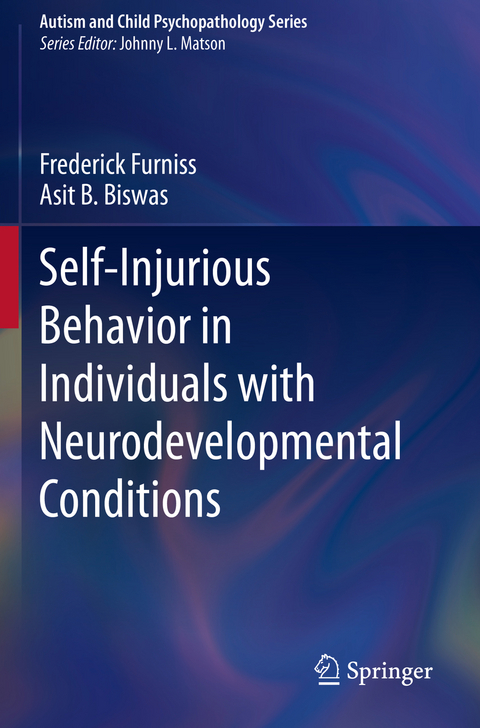
Self-Injurious Behavior in Individuals with Neurodevelopmental Conditions
Springer International Publishing (Verlag)
978-3-030-36018-4 (ISBN)
This book addresses self-injurious behavior (SIB) in individuals with various neurodevelopmental conditions (NDCs). It takes a cross-NDC perspective that synthesizes recent research on variability in incidence and presentation across NDCs and the natural history and neurobiology of SIB. Chapters examine implications for biobehavioral definitions of subtypes of SIB and provide a detailed guide to assessment and intervention using an integrated research-based model for individualized treatment. In addition, chapters present a practice-focused structure using case studies to illustrate clinical implications of research findings. The book concludes with a discussion of current directions in research and their potential to guide innovation in prevention and treatment of SIB.
Topics featured in this handbook include:
· Self-restraint among individuals who self-injure.
· Self-injurious behavior in individuals with autism spectrum conditions.
· Assessing and managing short-term effects of SIB.
· Reducing risk of, and responding to, relapse following successful intervention with SIB.
· Ethical issues associated with working with people who engage in self-injurious behaviors.
Self-Injurious Behavior in Individuals with Neurodevelopmental Conditions is a must-have resource for researchers, clinicians and practitioners as well as graduate students in the fields of clinical child and school psychology, applied behavior analysis, pediatrics, social work, developmental psychology, behavioral therapy/rehabilitation, child and adolescent psychiatry, clinical psychology and psychiatry of adult intellectual disability, and special education.
lt;p>Frederick Furniss, M.A., Ph.D., is an honorary clinical psychology teacher with the University of Leicester, U.K. He has more than 35 years of experience as a clinical psychologist working with children and adults with neurodevelopmental conditions, including extensive experience of assessment and intervention with people engaging in severe self-injury in both community and residential care settings. His clinical and research interests include assessment and intervention with self-injurious and restricted and repetitive behaviors and the relationships between cognitive and behavioral phenotypes in neurodevelopmental conditions.
Asit B. Biswas, M.D., FRCPsych, MMedSci, DPM, is a Consultant Psychiatrist with the Leicestershire Partnership NHS Trust specializing in the assessment and management of autism, ADHD, and challenging behavior in people with intellectual disabilities, having worked with the UK National Health Service for more than 28 years. He is also an Honorary Associate Professor at the University of Leicester, U.K., and was past Chair of the Specialty Advisory Committee (Intellectual Disability Faculty, Royal College of Psychiatrists) responsible for curriculum development, and design of assessment structures and training pathways, for both Core and Higher specialist training in the Psychiatry of Intellectual Disability for doctors working towards completion of training to work as Consultants in this subspeciality in the UK. He has previously held the role of Training Programme Director in Psychiatry of Learning Disability at the East Midlands deanery. His clinical and research interests include management of challenging behavior, such as self-injurious behavior and aggression, in people with intellectual disability, autism and ADHD. He was a Principal Investigator for a recently completed project evaluating the clinical effectiveness and cost-effectiveness of Positive Behaviour Support for people with learning disability and challenging behavior funded by the U.K. National Institute of Health Research. He is currently the Vice-Chair of the Intellectual Disability Psychiatry Faculty, Royal College of Psychiatrists, London.
Chapter 1. Conceptualization and Taxonomy of Self-Injurious Behavior.- Chapter 2. Phenomenology and Natural History of Self-Injurious Behavior.- Chapter 3. Neurobiology of Self-Injurious Behavior.- Chapter 4. Risk Assessment and Management and Ethical Issues.- Chapter 5. Assessment of Self-Injurious Behavior.- Chapter 6. Intervention with Self-Injurious Behavior.- Chapter 7. Assessment and Intervention with Self-Restraint.- Chapter 8. Self-Injurious Behavior in Persons with Autism Spectrum Conditions.- Chapter 9. Current Developments and Future Prospects for Prevention and Treatment of Self-Injurious Behavior.
| Erscheinungsdatum | 02.02.2021 |
|---|---|
| Reihe/Serie | Autism and Child Psychopathology Series |
| Zusatzinfo | XV, 341 p. 16 illus., 3 illus. in color. |
| Verlagsort | Cham |
| Sprache | englisch |
| Maße | 155 x 235 mm |
| Gewicht | 551 g |
| Themenwelt | Geisteswissenschaften ► Psychologie ► Entwicklungspsychologie |
| Geisteswissenschaften ► Psychologie ► Pädagogische Psychologie | |
| Medizin / Pharmazie ► Medizinische Fachgebiete ► Pädiatrie | |
| Medizin / Pharmazie ► Medizinische Fachgebiete ► Psychiatrie / Psychotherapie | |
| Sozialwissenschaften ► Pädagogik ► Sozialpädagogik | |
| Schlagworte | Anxiety and self-injury • Assessment of self-injury • Autism spectrum disorder and self-injury • Developmental disabilities and self-injury • Ethics and self-injury treatment • Genetic syndromes and self-injury • Intellectual disabilities and self-harm • Mood disorders and self-harm • Neurobiology and self-injury • Neurodevelopmental conditions (NDCs) and self-injury • Pain and SIB • Pharmacological treatments and SIB • Prevention, interventions, and self-injury • Psychosocial stressors and self-injury • Psychosocial treatments and SIB • Self-injurious behavior (SIB) and risk factors • Self-injury and neurodevelopmental disorders • Self-restraint and SIB • Sleep disturbances and self-harm • Tissue damage, wound management, and SIB |
| ISBN-10 | 3-030-36018-0 / 3030360180 |
| ISBN-13 | 978-3-030-36018-4 / 9783030360184 |
| Zustand | Neuware |
| Haben Sie eine Frage zum Produkt? |
aus dem Bereich


